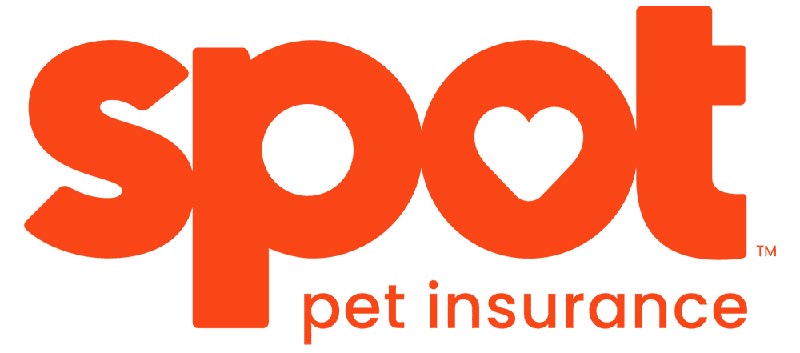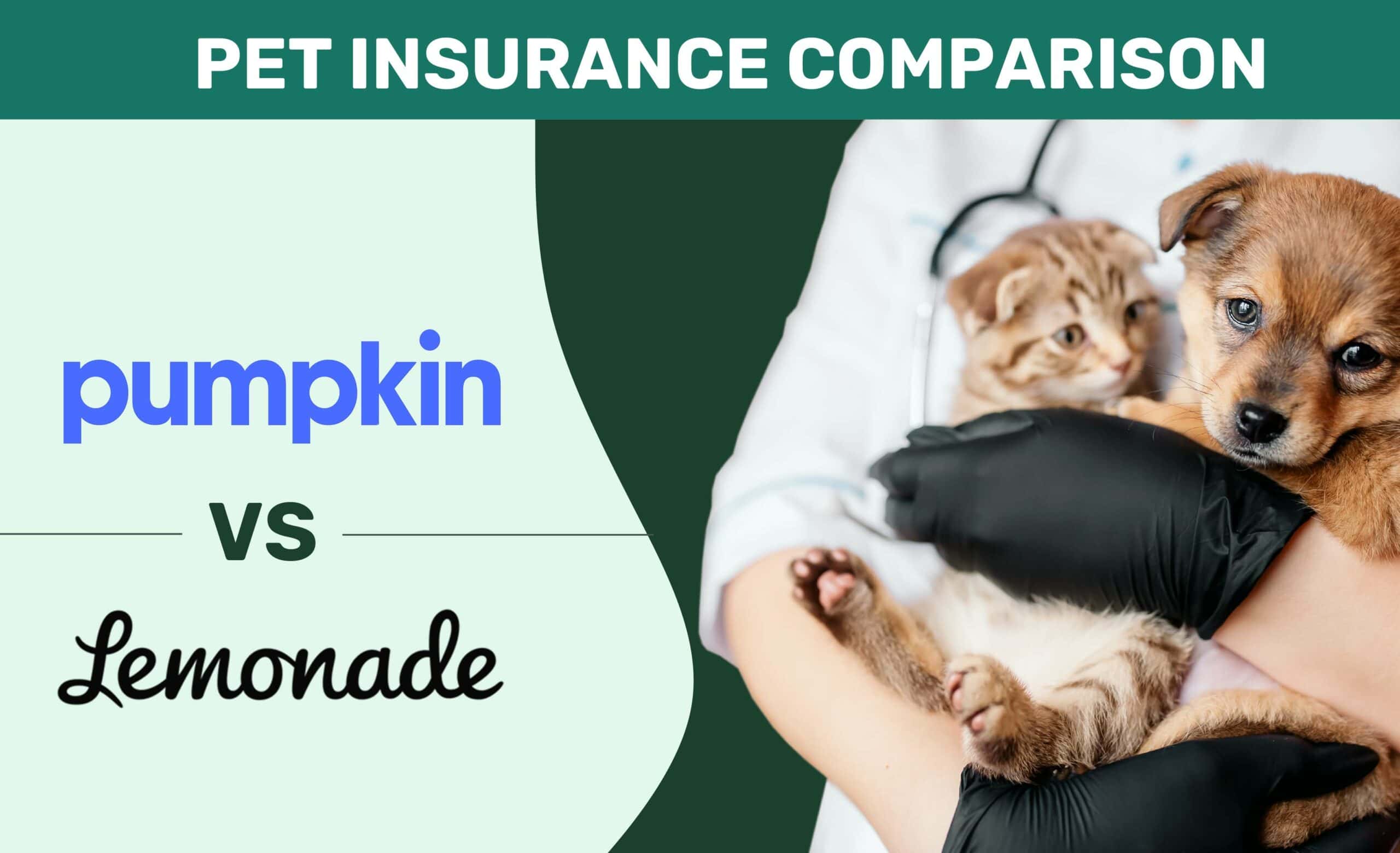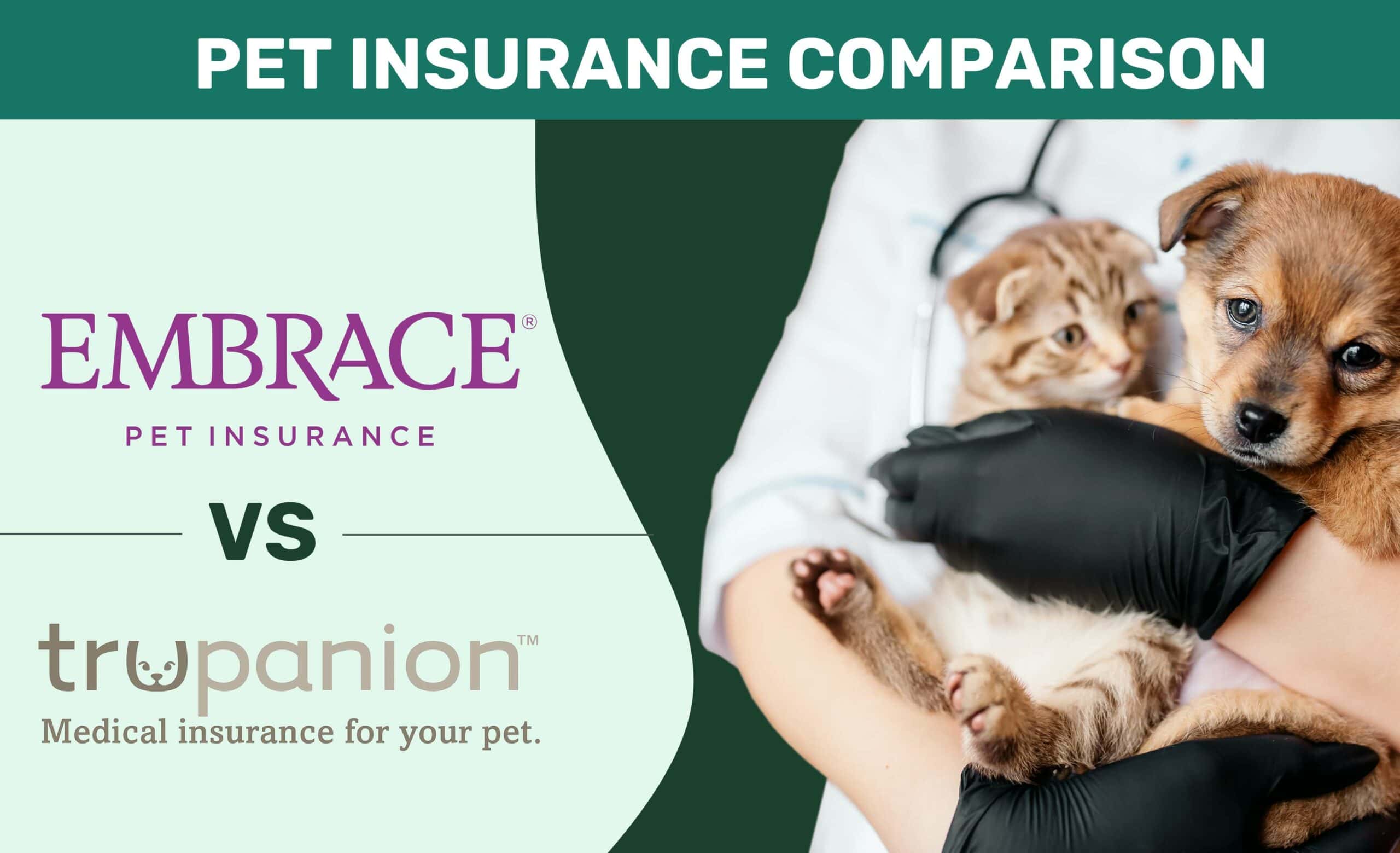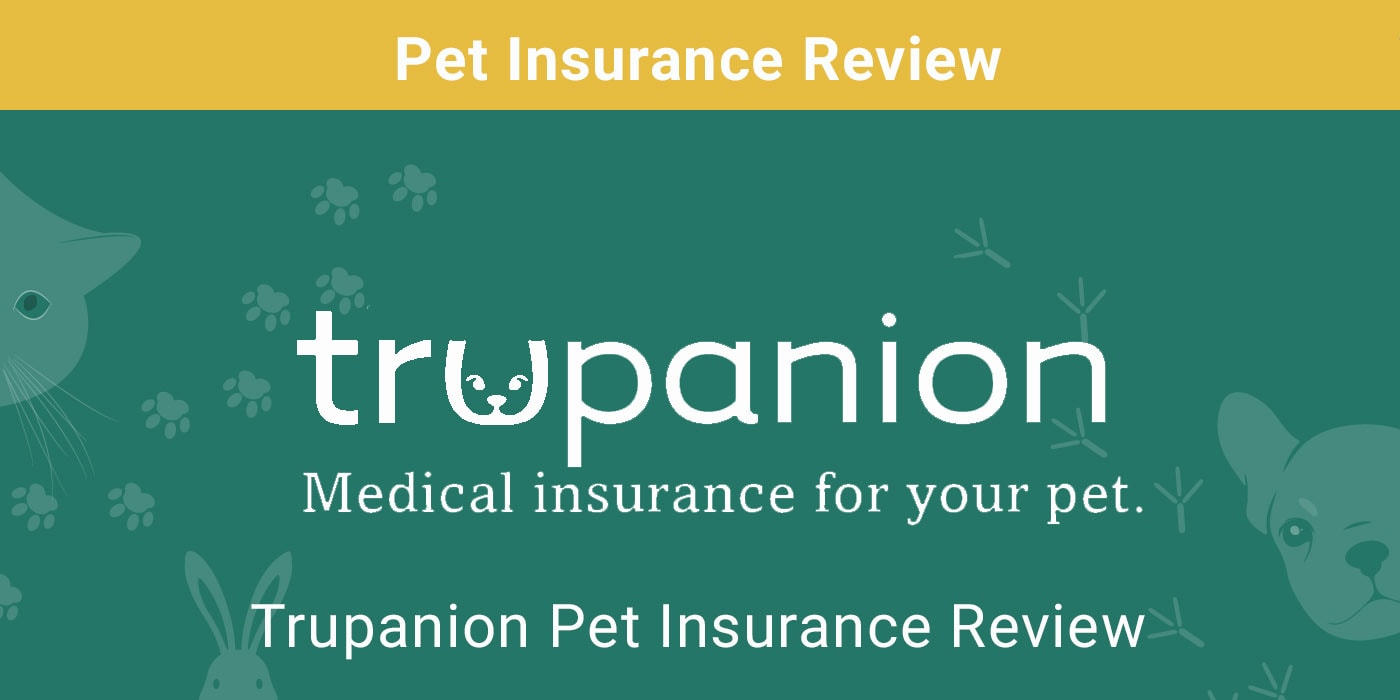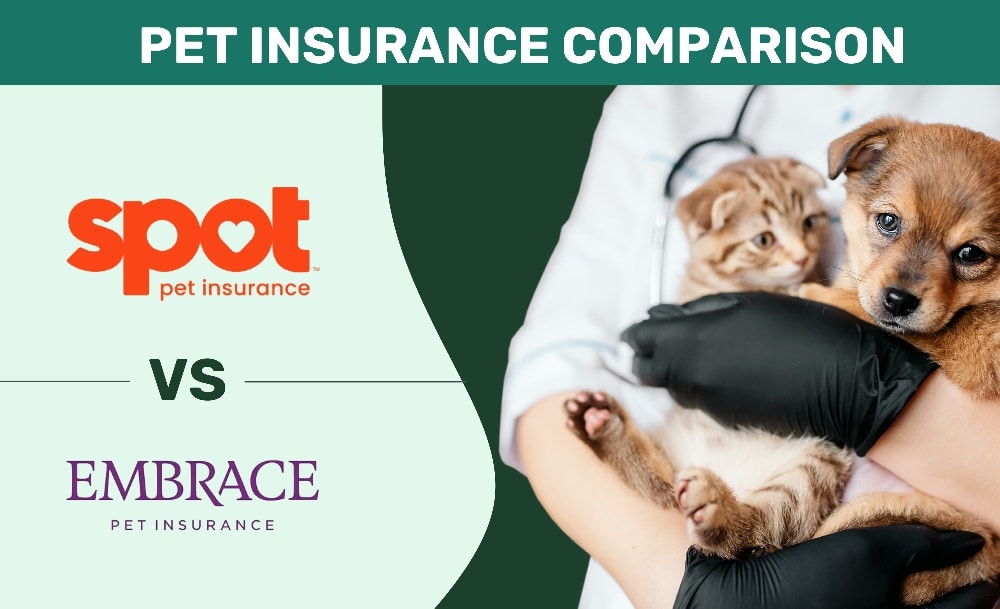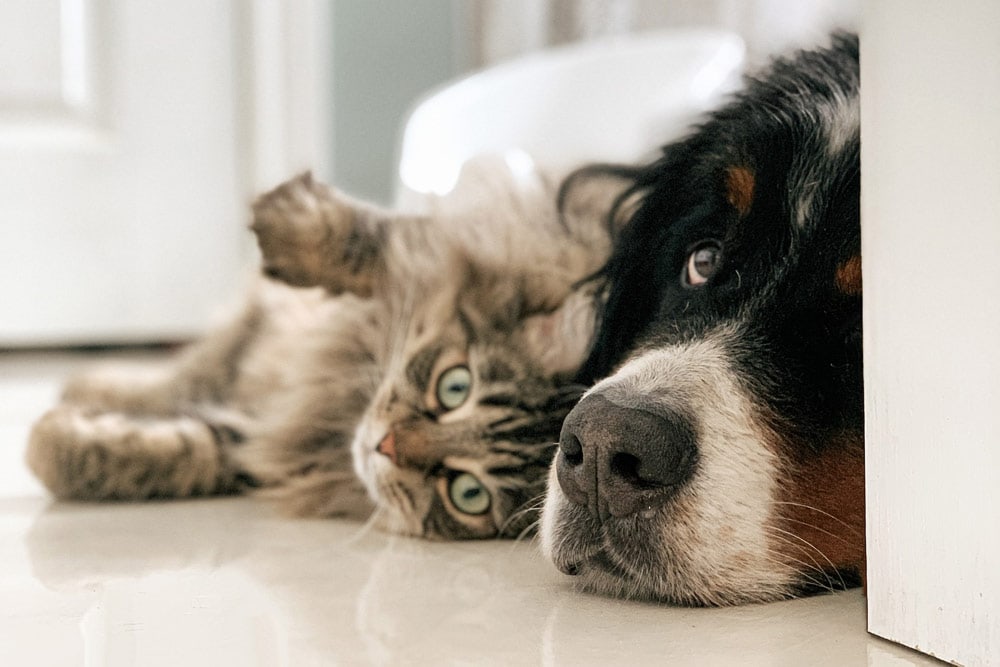
Emergency vet care has always been notoriously expensive.1 Did your puppy come down with an ear infection? That’s going to cost you $400, at least.2 Surgery? Thousands. You also have to budget for things like medication, follow-up vet visits, special diets, and rehabilitation.
Sadly, nearly half of pet owners can’t afford an unexpected vet bill.3 Many are forced to take out loans, max out their credit, dip into their savings, or make heartbreaking decisions about their pet’s health.
Investing in pet insurance means you won’t have to choose between going broke or foregoing the care your pet needs.
With so many pet insurance providers out there, however, it can be tough to know where to begin. Here, we provide an overview and comparison of the top 10 pet insurance plans available this year. We’ll also share practical tips to help you find the best insurance plan for your pet, plus answers to common FAQs and more.
A Quick Look at Our Favorites in 2024
| Image | Product | Details | ||
|---|---|---|---|---|
| Best Overall |

|
Lemonade |
|
Click to Get Quote |
| Best Value |

|
ASPCA |
|
Click to Get Quote |

|
Fetch |
|
Click to Get Quote | |

|
Trupanion |
|
Click to Get Quote | |

|
Spot |
|
Click to Get Quote |
The 10 Pet Insurance Provider Comparisons
1. Lemonade Pet Insurance – Best Overall
Lemonade is our choice for the best overall pet insurance plan. Standard Lemonade policies cover illness, accidents, hospitalization, diagnostic and surgical procedures, prescriptions, and more.
You can also add riders like their preventive care policy which will reimburse you for vaccines, annual check-ups, and parasite screening. Their claims process is also one of the fastest and most convenient out there. You’ll get access to their AI-powered mobile app, where you can file claims and get paid in minutes.
We also love that Lemonade is a Certified B-Corporation, which means that a portion of its profits is donated to pet charities.
It should be noted, however, that Lemonade is only available for cats and dogs, and not all states are eligible for coverage. Additionally, Lemonade does not cover dental care or behavioral treatments.
2. ASPCA Pet Insurance – Best Value
The American Society for the Prevention of Cruelty to Animals (ASPCA) has been a leader in animal welfare for over 150 years. Their pet insurance plan offers incredible value, especially if you have an older pet prone to hereditary or congenital conditions. ASPCA’s plan includes standout coverage for these illnesses with no age cap. Unlike most providers, ASPCA also covers curable pre-existing conditions as long as they don’t display symptoms for 180 days and only require a 14-day waiting period before your coverage kicks in.
With an ASPCA policy, you’ll also get coverage for stem cell therapy, microchipping, and other special treatments. To help manage costs, ASPCA also lets you make monthly payments—just be aware that there’s a transaction fee. Additionally, claims processing may take up to 30 days.
3. Fetch Pet Insurance
Fetch by the Dodo is an excellent choice for kittens and puppies. They offer plans that cover pets as young as six weeks old, and they don’t have an upper age limit. You can also mix and match annual benefit options and deductibles for the ideal coverage.
Aside from standard coverage for illness and accidents, Fetch base policies also include medical boarding expenses, behavioral issues, and exam fees. We also like how they offer coverage for dental illness for all teeth since some providers only cover canine teeth.
Fetch does have a strict reimbursement policy: you only have 48 hours to visit the vet after noticing symptoms, or else your claim could be denied. Their waiting period for hip dysplasia and knee injuries is also quite long at six months. There’s also no option for preventive care.
4. Trupanion Pet insurance
Trupanion’s pet insurance plan is incredibly comprehensive. Their standard coverage also includes dental illnesses, alternative treatments, prescription food, and even prosthetic devices. They’re also one of the few companies that cover breeding and working pets.
Their direct payment software also takes the stress out of reimbursement since Trupanion pays your vet directly. There’s also no limit for benefit payouts, whether that’s for a lifetime, monthly, or per incident coverage, all of which are eligible for 90% reimbursement.
However, there’s a huge catch: Trupanion only offers one plan for cats and dogs, and it comes with a hefty premium. They also don’t cover preventive care, so you’ll need to take your pet for regular check-ups at your own expense.
5. Spot Pet Insurance
If you want the best possible coverage and don’t mind paying extra for it, consider Spot Pet Insurance. The company offers unlimited annual coverage, so you don’t have to worry about maxing out your policy in a single year. Spot also has a 100% coverage option which you can combine with their lowest deductible ($100) to bring down your out-of-pocket costs.
Elderly pets are also welcome since there’s no age limit with Spot. You’ll also get access to a 24/7 telehealth helpline that can provide valuable advice when you need it most.
That said, expect higher premiums if you go for a low deductible and/or low co-payment. Spot’s policies for young pets are also more expensive than other providers. Finally, you’ll be charged transaction fees for anything other than annual payments.
6. Pumpkin Pet Insurance
Pumpkin is another good option for kitten and puppy owners. You can add a preventive care package to the standard policy, which includes vaccines, wellness exams, and fecal tests. On the other hand, they will also cover senior pets with no upper age limit. Pumpkin also has one of the shortest waiting periods at 14 days, and that covers all conditions, including hip and knee dysplasia.
Unfortunately, Pumpkin doesn’t offer any accident-only plans. Preventive packs also don’t pay out for dental cleanings and desexing procedures.
7. Figo Pet Insurance
Don’t want to shell out for co-payments? Figo’s 100% reimbursement with no yearly limits may fit your needs. You can also combine that with low deductibles to reduce your out-of-pocket costs.
All Figo policyholders also get access to a pet cloud app with features such as a 24/7 vet helpline, claims management, and payment processing. In case of accidents, Figo has the shortest waiting period of all providers at just one day.
On the other hand, there’s a lifetime maximum for all policies, and they’re also very strict when it comes to covering congenital and hereditary conditions. Some features that come standard from other providers, such as reimbursement for physical therapy and exam fees, are only available as add-ons with Figo.
8. Nationwide Pet Insurance
Nationwide doesn’t just cover cats and dogs; birds, exotic pets, and small mammals are welcome, too. Their Avian & Exotic Pet Plan offers up to 90% reimbursement for covered illnesses and accidents, plus you can add preventive care on top of that. However, you need to contact them directly for a quote, while dog and cat owners can easily enroll on Nationwide’s website.
Nationwide’s policy options for cat and dog owners include three accident and illness plans, two wellness care options, and riders for preventive care. There’s also a free 24/7 telehealth app so you can get advice from an experienced vet whenever you need it.
A major downside is that Nationwide only offers one deductible option, which costs $250. They also impose reimbursement limits on common conditions and procedures.
9. Healthy Paws Pet Insurance
Healthy Paws Pet Insurance only offers one policy for cats and dogs, but it has one of the best coverages for alternative treatments. As long as the procedure is performed and prescribed by a licensed vet, you can get your pet treated with laser therapy, acupuncture, chiropractic care, massage therapy, hydrotherapy, and other non-traditional treatments.
Their policy also has no limit on the amount that can be claimed in a year and no limit on total lifetime reimbursement. You can also get direct payments to your vet, plus choose your deductible level from $100 to $500. Their claims processing is fast and convenient, too – you can do it all thru their mobile app and be reimbursed in as quick as two days.
Owners of senior pets may want to look elsewhere, however, because Healthy Paws offers very limited coverage for elderly pets. Behavioral treatments are not covered as well, and conditions like hip dysplasia and cruciate ligament injuries have limited coverage.
10. Embrace Pet Insurance
At Embrace, even pets 15 years or older are welcome as new enrollees. Accident-only coverage is available for these senior pets. For every year you don’t submit a claim, Embrace will also reduce your yearly deductible by $50, which is a nice incentive on top of having a healthy pet.
In case of accidents, Embrace only applies a 48-hour waiting period. They also offer a 30-day money-back guarantee on all policies (pro-rated if you already submitted a claim before that period).
On the flip side, Embrace doesn’t offer policies with unlimited benefits. There are no preventive care riders as well. And while the company does cover dental illness, there’s an annual cap of $1,000.
Buyer’s Guide: How to Compare Pet Insurance Plans
What to Look for in Pet Insurance
When shopping for pet insurance, be as critical and detail-oriented as you would when buying health insurance for yourself. Once you sign that contract, you’re locked into that plan for as long as you’re paying for it.
Make sure you understand the following elements of a pet insurance plan:
Policy Coverage
Pet insurance providers offer tiered plans with varying levels of coverage: basic, mid-range, and comprehensive. The more you pay, the more coverage you get.
In general, pet insurance plans only cover emergency or unexpected medical costs, but it still depends on the plan. For instance, if your dog gets kennel cough and their vaccines are not up-to-date, the provider may not cover the cost of treatment.
Other policy features you should look into are deductibles (the amount you pay out-of-pocket before insurance kicks in), annual limits, and waiting periods.
Customer Service & Reputation
Fellow pet owners are the best sources of information when it comes to pet insurance. Ask around in online forums or support groups and look for customer reviews on Yelp, Google, the Better Business Bureau, and other review sites.
Also, consider the customer service of a pet insurance provider when researching plans. Do they have an online portal for filing claims? Are their call center reps knowledgeable, friendly, and patient? How long does it take to get a response when you have a question?
Keep in mind that pet insurance often comes into play during emergencies. You want a provider that’s efficient, compassionate, and reliable when you need them the most.
Claim Repayment
Be sure to read through the policy’s fine print to look for details on how and when they’ll reimburse you. Some providers only offer direct deposit, while others may offer a check, digital payment platforms like PayPal, or a card you can use to pay for services at the vet’s office.
You also need to know what type of receipts they’ll accept as proof. Most companies require invoices with itemized charges and a description of services provided. Several providers have their own forms that need to be filled out when you file a claim.
Don’t forget to ask about their reimbursement process. Do you need to contact them before or during treatment? Are there specific steps to follow when submitting a claim? What information do they need from your veterinarian in order for you to get paid?
Also, find out if they offer online claims submission and how long it typically takes for claims to be processed. The last thing you want is to wait weeks for the bills to be settled.
Price of Policy
Don’t just compare the monthly premiums when shopping for pet insurance. Factor in the co-pays, deductibles, and exclusionary factors that affect how much you’ll spend. Also, consider any promotional offers or discounts available to make sure you’re getting the best value for your money.
For example, some plans offer multi-pet discounts, while others may give you a break on your rate if you purchase a policy during certain times of the year. Some pet insurance companies also partner with other organizations, such as animal rescues, retail stores, or vets, to offer discounts on their plans.
Plan Customization
The more flexible the plan, the better. Look for policies that allow you to tailor your coverage to fit your needs. For instance, some providers let you choose which vet you visit, while others have a network of approved clinics.
Inquire about their available add-ons, too. Some companies offer extras like coverage for routine care, alternative treatment options, theft protection, and even end-of-life care.
Medical Conditions & Exclusions
Finally, make sure you understand any medical conditions and exclusions associated with the policy. Most pet insurance plans cover accidents and illnesses but exclude things like pre-existing conditions, elective treatments (such as spaying/neutering), behavioral issues, and certain congenital or hereditary problems.
In relation to that, check their breed-specific policies as well. For instance, German Shepherds may require special coverage for hip dysplasia, while flat-nosed breeds, like French Bulldogs and Pugs, may need particular care for breathing problems.
The age of your pet may also play a role in the type of coverage you get. Some plans limit coverage for older animals, while others may impose restrictions on puppies and kittens. So be sure to check age limits when selecting a policy.

FAQ
How Long Is the Waiting Period Before Coverage Starts?
The waiting period varies from one provider to another, but most companies require a 30-day waiting period before coverage begins. During this time, any expenses related to your pet’s health will not be covered by the policy.
The reason behind the waiting period is to ensure that pet owners don’t abuse the system and sign up for pet insurance right after their pet experiences an illness or injury. The waiting period provides a buffer to ensure that all claims are legitimate.
Can I Cancel My Policy at Any Time?
Most pet insurance policies allow for cancellation at any time, though you’ll likely have to pay a penalty fee. Be sure to read your policy carefully for specific details on cancellation fees or other charges that could apply to you.
Can I Choose My Own Veterinarian?
It depends on the policy you choose. Many pet insurance companies have a network of approved veterinarians, but some may allow you to visit any veterinarian you choose. We recommend confirming this before you purchase the plan.
Do I Need to Get a Vet Check-Up Before Purchasing Pet Insurance?
Yes, most pet insurance companies require pet owners to get a comprehensive vet check-up prior to approval. This allows you to get an exact estimate of your pet’s health, which can help you make the right decision when selecting a policy. It can also speed up your reimbursement process plus reduce the risk of your claims getting rejected.
Can I Switch Pet Insurance Providers If I Am Not Satisfied With My Current Plan?
Of course. But before canceling your current policy, make sure you understand any cancellation fees or penalties associated with switching plans and read the terms and conditions of your potential new provider.
Can I Get Pet Insurance for My Older Pet?
It depends on how old your pet is and its current health condition. Some plans are available for older pets, but they may have age limits or exclusions that you need to be aware of before signing up. Other companies have a ceiling on the age of the pet they will insure.
Can I Get Pet Insurance for More Than One Pet?
Yes. Many providers even offer discounts on their rates if you have multiple pets that need coverage. Check with your provider to see what options are available.
How Do I File a Pet Insurance Claim?
The process will vary depending on your provider. Generally, you’ll need to contact them by phone or email and provide details such as your pet’s name, date of birth, a description of services performed, and proof of payment (e.g., an invoice).
Typically, you’ll also need a complete medical history and records from your vet, which may include lab results or X-rays. Your provider will let you know what additional information they need in order to process your claim.
Most companies also have an online claims submission system that allows you to upload receipts and other documents directly from your computer or mobile device.
Can I Get Pet Insurance for a Pre-Existing Condition?
Unfortunately, most pet insurance companies don’t cover pre-existing conditions. However, some may offer coverage for chronic illnesses if they’re diagnosed after the policy is in effect. Don’t hesitate to ask about it, though – some providers are more lenient than others, or offer additional policies for pre-existing conditions.

What the Users Say
The majority of reviews for pet insurance policies are positive, especially among those who’ve successfully claimed for their pet’s medical costs. Most reviews mention the ease of submitting a claim, as well as the responsiveness and helpfulness of customer service reps.
On the other hand, there are a few complaints about pet insurance policies. Some users have reported that their claims were denied or delayed, while others have mentioned issues with the cost of premiums. Additionally, some pet owners feel that they don’t get enough coverage for their money.
Ultimately, your experience will come down to the provider you choose and how well you understand the policy you’re signing up for.
Which Pet Insurance Provider Is Best for You?
The best insurance provider is one that meets your needs and budget. This is why we recommend getting a comprehensive vet check-up BEFORE you even start shopping for pet insurance plans. This will help you anticipate the potential medical costs your pet may face, and you can use that information to select a plan that offers the right level of coverage.
For instance, what common health problems does your pet’s breed typically face? How about your lifestyle? While accidents are unpredictable, the risk is higher if you regularly take your pets outdoors (e.g., hiking, camping, traveling) versus if they were kept indoors all the time.
You also want to make sure your policy has enough approved vets in your area, particularly if they don’t allow you to choose your own. You don’t want to have to drive long distances when your pet needs medical care!
Ultimately, your experience will come down to the provider you choose and how well you understand the policy you’re signing up for. Take the time to research all of your options, speak with your veterinarian, ask potential providers as many questions as you can, and read customer reviews before making your decision.
Conclusion
Pet insurance is an invaluable investment in both your pet’s health and your finances. Just like insurance for humans, there are a lot of factors to consider when choosing the right pet insurance policy, including your pet’s age and breed, coverage options, exclusions, reimbursement process, riders, extras like mobile apps, and cost.
Weigh your options carefully, and don’t settle for any pet insurance provider without doing extensive research. With so many different providers offering various coverage levels, you’re sure to find one that works for you and your four-legged friend. Good luck!
Featured Image Credit: Louis-Philippe Poitras, Unsplash









